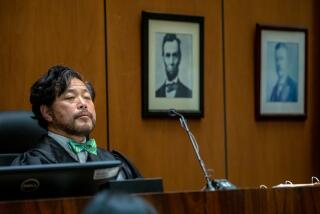Judge Keeps Records Sealed in Jackson Molestation Case
- Share via
SANTA MARIA, Calif. — With a rebuke to a media attorney, a Santa Barbara County judge Friday refused to open sealed documents in the Michael Jackson case.
The child-molestation case against the pop star has been conducted with an unusual concern for privacy. The grand jury that indicted Jackson in April met at an out-of-the-way sheriff’s facility, and the indictment it handed down was heavily edited, with 28 specific allegations and the names of alleged conspirators blacked out.
On Friday, Theodore Boutrous Jr., an attorney representing 10 large news organizations, including the Los Angeles Times, criticized what he called “a virtually impenetrable veil of secrecy” that has enveloped the case. Transcripts of the grand jury’s hearings have been sealed, as have 47 search warrants that otherwise would have been made public.
“We could go through the summer without the public learning anything more than the bare minimum about this case: that charges have been filed,” Boutrous said.
Santa Barbara County Superior Court Judge Rodney S. Melville was displeased by Boutrous’ suggestion that his decisions to seal the documents had run afoul of the 1st Amendment.
“You need to not mislead the public and the press that I’m doing something against the law,” the judge told Boutrous, adding that Jackson’s worldwide fame makes it “very difficult” to ensure a fair trial.
Melville said he sealed records only after weighing Jackson’s right to a fair trial against the rights granted by the 1st Amendment, which include freedom of speech and freedom of the press.
The issue is likely to become even more contentious as pretrial hearings continue. Jackson’s attorneys have indicated they planned to file a voluminous motion to suppress evidence gathered by law enforcement officials.
Sealing such a motion or closing the hearings that follow it could deny the public critical information, according to some legal experts.
“A motion to suppress ordinarily alleges that the police and other government agencies didn’t follow proper procedure,” said Laurie Levinson, a professor at Loyola Law School. “Those are the very issues the public needs to know about.”
Levinson, a former federal prosecutor, criticized what she saw as a “knee-jerk reaction” by the court.
“There is not a special Michael Jackson exception to the 1st Amendment,” she said.
With so much material shielded from the public, attorneys Friday strained at times to make themselves understood when alluding to witnesses and exhibits they were not allowed to identify.
To clarify matters they could not discuss in public, they met behind closed doors for about an hour.
Neither prosecutors nor defense attorneys have objected to records in the case being closed.
“For them, it simplifies things,” Boutrous said outside the courtroom. “But over and over, the Supreme Court of the United States has ruled that’s not a justification.”
Boutrous said he would decide next week whether to make his case before an appellate court.
A gag order prevents lawyers on either side from talking to the media. In court, though, Jackson’s lead attorney, Thomas A. Mesereau Jr., said his client would be hurt by the release of the grand jury transcript “on the eve of trial.”
The trial is scheduled to start Sept. 13. However, the judge has acknowledged that was an optimistic goal.
The next hearing is July 9.
More to Read
Sign up for Essential California
The most important California stories and recommendations in your inbox every morning.
You may occasionally receive promotional content from the Los Angeles Times.














